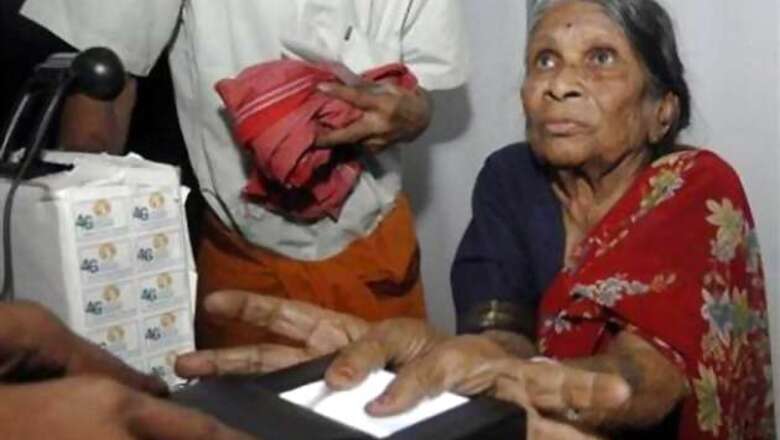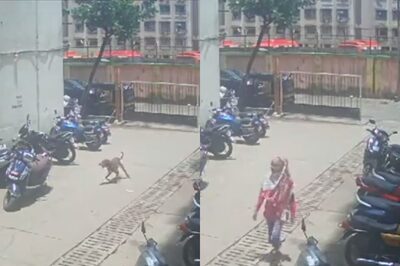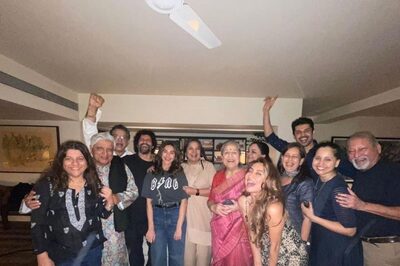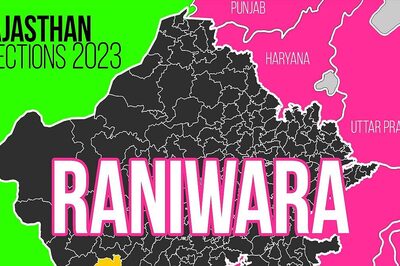
views
The line between the Congress party and the Congress led UPA government seems to blur as the party and the government go all out to sell their ambitious direct cash transfer scheme. 'Aap ka paise, aap ke haath' is the new slogan for 2014 elections. The government claims that the entitlement/cash would reach the beneficiaries' bank account directly and, hence, reduce corruption. But, the claims of the government have been already been questioned both by people who never got the promised cash and, activists who point out to the high risks involved in such a fundamental shift. CNN-IBN's Rupashree Nanda spoke to Dr Usha Ramanathan, who has worked extensively on the issue at the ongoing Right to Food campaign in Jantar Mantar. Ramanathan is scathing in her criticism of the direct cash transfer scheme which would rely heavily on Aadhaar/UID. Ramanathan says, 'biometrics is both changing and undependable', 'banking correspondent system will be the new cause of corruption', and 'it is only about reducing cost to the State, people be damned'.
CNN-IBN: Right to Food campaign is strongly opposed to cash transfers schemes. What are your objections?
Dr Usha Ramanathan: I will leave the cash transfer itself - whether cash transfers is good or not - to the Right to Food campaign to tell you. I have been studying the system through which they are planning to do this and, that includes questions of financial inclusion which includes banking correspondents, the capacity of banks and the willingness of banks to do this. The second is biometrics and, third is what they are calling, fraudulently to my mind, is micro ATMs. Micro ATMs are micro. That is the only true thing about them. They are not automatic and they do not tel and it's not the machine that is going to operate for the people. The only place where they are expected to work is for determining biometrics. When we go to the ATM, there is a card; there is no card in this. You put in the card, you have the autonomy and, the third thing is that it is a cash dispenser. None of this is true about micro ATMs. You need human intervention at every point which is what they say is the problem when it comes to the problem of corruption. Second thing is on biometrics, all the evidence that has emerged so far clearly show us that biometrics is both changing and undependable. I am not saying this from some studies that have been done outside... the Unique Identification Authority of India (UIDAI) reports themselves reveal that quite clearly. So, if you take their finger print authentication report, it reads like a comedy. For instance, it's found that the thumb and index finger which is what many people presume works for purposes of authentication or, for enrolment actually does not work for the Indian population. Out of 50,000 people, for 45% of them, this did not work. We are taking of finding a 'best finger detection'... doing a best finger detection after which if you remember which finger that is and keep it carefully and you keep two or three times after you've done it, it might authenticate you. On Iris scan, they start with an assumption that Iris never changes and there is no basis for that belief at all. In fact since then you've had an Iris report that has come, a longitudinal study which has been done in Notre Dame university which shows that not only does it change, it changes within one and half to three years. Which means is by the time they have done their enrolment, it is going to be useless already. All this leads me to believe that it is not about delivering services to the poor they are worried. It is only about reducing cost to the state and people be damned and that is completely unacceptable.
CNN IBN: The government is claiming that this will help to step corruption and that cash will be delivered to beneficiaries at their doorstep?
Usha Ramanathan: When they are saying that cash will be delivered, they are relying on banking correspondents. Reserve bank of India started this in 2006 and,in 2009 they issued a report admitting that the system of banking correspondents was a failure. And, they have given five reasons why it has happened. None of these issues have been addressed.So it is very plain that they are using this to dismantle the service structure. What I wonder is when sometimes there is evidence in writing on record publicly why is that being ignored? The banking correspondent system failed a long time ago and the banking correspondent system will be the new cause for corruption. They are creating agents, middlemen, agents on whom you have to depend. And who do you have to depend on? On kirana store people. Do they any have any idea of what a power structure is in a village? Do they have any idea about who should not control the monies of the poor in that village? They don't. Self Help Group, Kirana Store...it does not matter ... we will put it wherever the micro ATM can travel and see where it goes. This is really gross experimentation on a whole population and it is not taking responsibility for the consequences.
CNN IBN: The UID was supposed to be voluntary. But now with many schemes linked to that, many don't have the choice to opt out?
Dr Usha Ramanathan: Actually when you read their strategic vision document which was there right from the beginning. They said we will not make it compulsory, somebody else might make it compulsory. So, Mr Chidambarm says we are making it compulsory for these 29 schemes, the state governments will make it compulsory for many more things. This is one reason they don't have a law because the law will govern what they do. For instance, they say the poor have no interest in privacy. Says who? What do they know about the interests of the poor in privacy? Dr Ahluwalia will say if you want services, you have to allow us to converge all your data. Every report that has come which says you have to shift to cash transfers - if you have to make any change in the system you have to privatise information and data - all these are Mr Nilakeni's reports. So there is a collusive force at work here and innocence attributed to Mr Nilakeni is capitalised on. I don't see that innocence, I don't know where other people are seeing it.
CNN IBN: How would you view Mr Nandan Nilakeni's role?
Dr Usha Ramanathan: Mr Nilakeni's ambitions are different from the ambitions of the others. He is bringing these ambitions to match - that's his job. He has been asked to market the matching of these ambitions. His ambition is to create a data base where everybody will be there. The Unique Identification Authority of India (UIDAI) itself went from place to place pushing for the adoption of this system. It is not innocent that this collusion has happened. I am not going to here consider whether Mr Nilakeni wants the consequences that are going to ensue from this but, I am certainly going to say that Mr Nilakeni does not care very much. And, he is not taking responsibility. So this idea that - I create open architecture - I push everyone to come on to it but - I take no responsibility for it, that seems to be the frame of mind that allows for this push which will get the poor into a very bad situation. In the Notre Dame study, they said within one and half to three years the confidence level in biometrics will come down by 20 per cent. What is the value of this? And, you are changing whole systems knowing thus. How can that ever be inncocent?




















Comments
0 comment